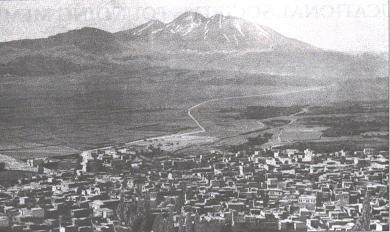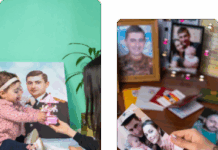Sirvart-Auntie was a “leftover of the sword.” This remarkable woman, a native of Fenesse, Turkey, and a survivor of the Armenian genocide, was the reason my great-grandmother, Vartanoush Kezelian, her fellow survivor and sister-in-law, made it to America. Sirvart Kerkorian, who was always referred to with the Armeno-English construction “Sirvart-Auntie,” was deeply respected by the succeeded generation of the family for her bravery and for her role in our move to the New World and to Detroit in particular. But few people knew the literal scar she carried on her back her entire life.
Last spring, President Erdogan of Turkey made headlines when he openly used the derogatory phrase “kilic artigi” or “leftover of the sword”, a reference to Greeks, Assyrians, and especially Armenians who had escaped the Ottoman scimitar during 1915 and the ensuing years of massacre in the WWI era. The connotation of the term is to degrade Armenians and other Christians still living in Turkey as some kind of “infidel trash” who had survived the death by sword that the Ottoman Turks inflicted on their Christian subjects. Erdogan associated the word with terrorists. I associate it with a great-aunt I never knew.
Sirvart was the wife of Haji Margosian (we don’t know his real first name), the older brother of my great-grandmother Vartanoush (nee Margosian). Haji was drafted into the Turkish Army. The Margosians as well as Sirvart walked the death march to Der Zor. At some point, they got separated. Vartanoush, after many adventures that space does not permit me to share, ended up in an orphanage in Aleppo. Sirvart was with a group of Armenians that were attacked by a group of…soldiers? Bandits? It’s unclear, but the men were cutting down Armenians with, quite literally, swords. Sirvart was slashed across the back and fell to the ground. She played dead until the men were gone. After the war, she made it to Adana where she married Armenian Legionnaire Khachig Mashlakjian (later changed to Kerkorian) and came to Detroit. Khachig ran into his first cousin Onneg Kezelian in an Armenian coffeehouse in town. Onneg wanted a wife too. Sirvart knew Vartanoush was alive in the orphanage and sent for her. And so, because of this woman who, under her housedress, carried the scar of an Ottoman sword across her back for the rest of her life, I am here today.
Erdogan’s reckless use of the word “leftover of the sword” displays a callous indifference toward the lives of Armenian people. We Armenians have constantly asked for recognition, for some kind of restitution or justice. What justice? Erdogan, and the rest of the Turkish leadership, Turkey as a state if you will, has been unrepentant. Let us repeat that word: Unrepentant. Because Erdogan’s use of this word also acknowledges the Genocide itself. There can be no leftover of the sword if there was no sword, after all. They know what they did. Imagine a world where Angela Merkel tries to rehabilitate the image of Adolf Hitler and the Nazi Party, and not only denies that the Holocaust happened, but spends untold amounts of money to cover up the fact that it happened and wage a propaganda war against the Jewish community. Imagine a world where German immigrants walk through the streets of New York City calling for Jews to come out of their homes. And imagine a world where, all this being said, “leftover of the gas chamber” is a common derogatory term for Jews in Europe.
Armenians are living in such a world right now. Non-Armenians find it hard to understand why we care so much about a historical event that happened 100 years ago. Many of us had even begun to relegate the issue to a back burner. Some of us were well settled in the Diaspora and concerned with American politics, for example. Others insisted that the current well-being of the Republic of Armenia was more important than “all that Genocide stuff.” The Ottoman Empire seemed like something unreal and belonging to a vanished 19th-century world. We became complacent about Genocide recognition.
We were wrong to become complacent. Not because there is a real possibility of regaining Western Armenia or Cilicia. Not because there is really any possibility of reparations. We were wrong, rather, because Turkey is unrepentant. Turkey and Turkish society have not owned up to what their ancestors did. Yet, many, I would dare say most of them, actually do know that it happened. Certainly their leadership does. And to continue to deny something that you know happened is to justify it. To use “leftover of the sword” as a derogatory term is not even to deny it anymore – it is to justify it. To say they were right to kill Armenians with the sword. To say they were right to cut down Sirvart-Auntie with the sword. And it is also to say that anything Turkey, and by extension, Azerbaijan does in their national interest is justified, and that Armenians’ lives do not matter. It doesn’t matter if grandmothers and children are killed in the shelling of cities. And those who are left, will be “leftovers of the drone.” Turkey has openly helped Azerbaijan in the current war, as we all know. How can a member of NATO – that is, one of the closest allies of the United States, which is supposed to be a beacon of democracy and human rights – do these things, and remain a member of NATO?








